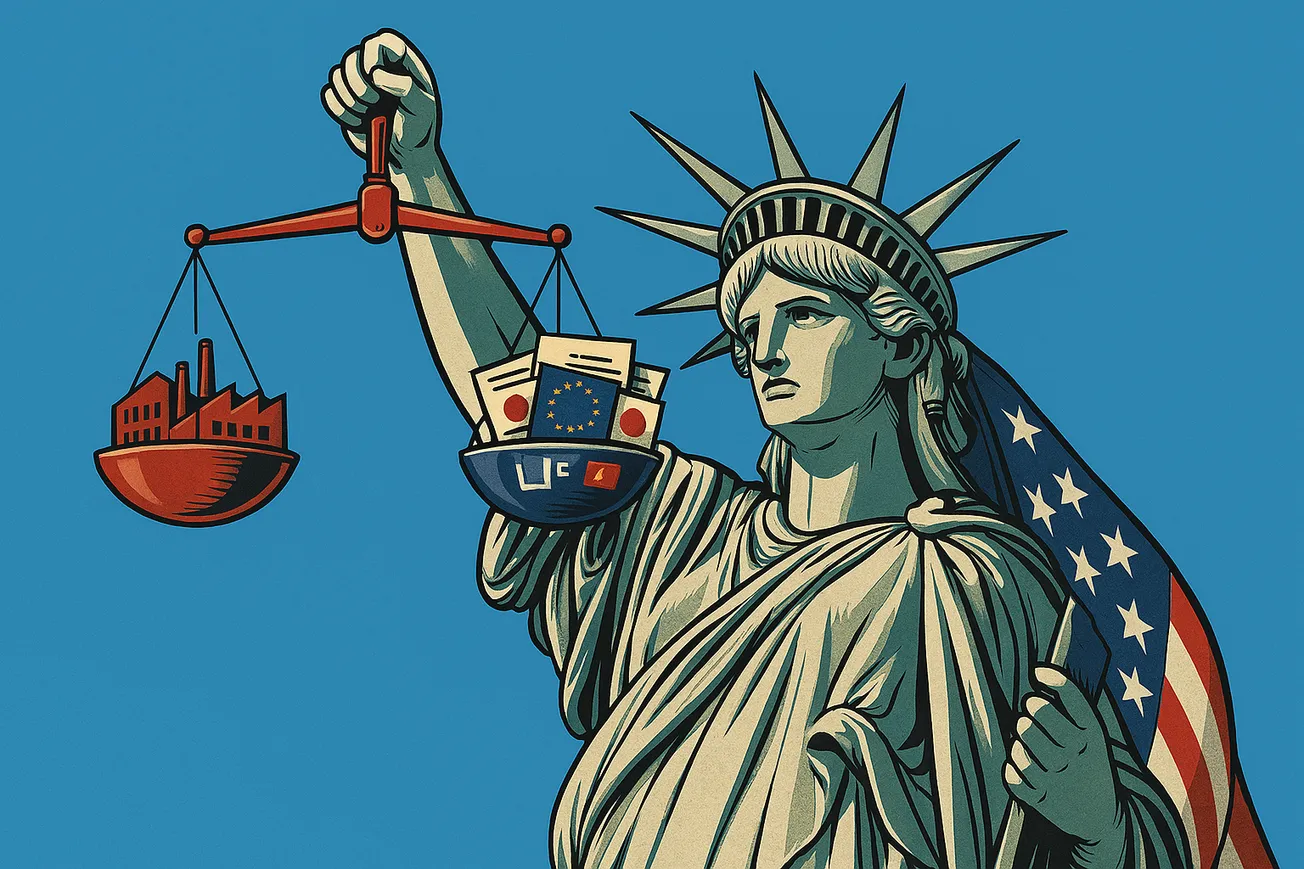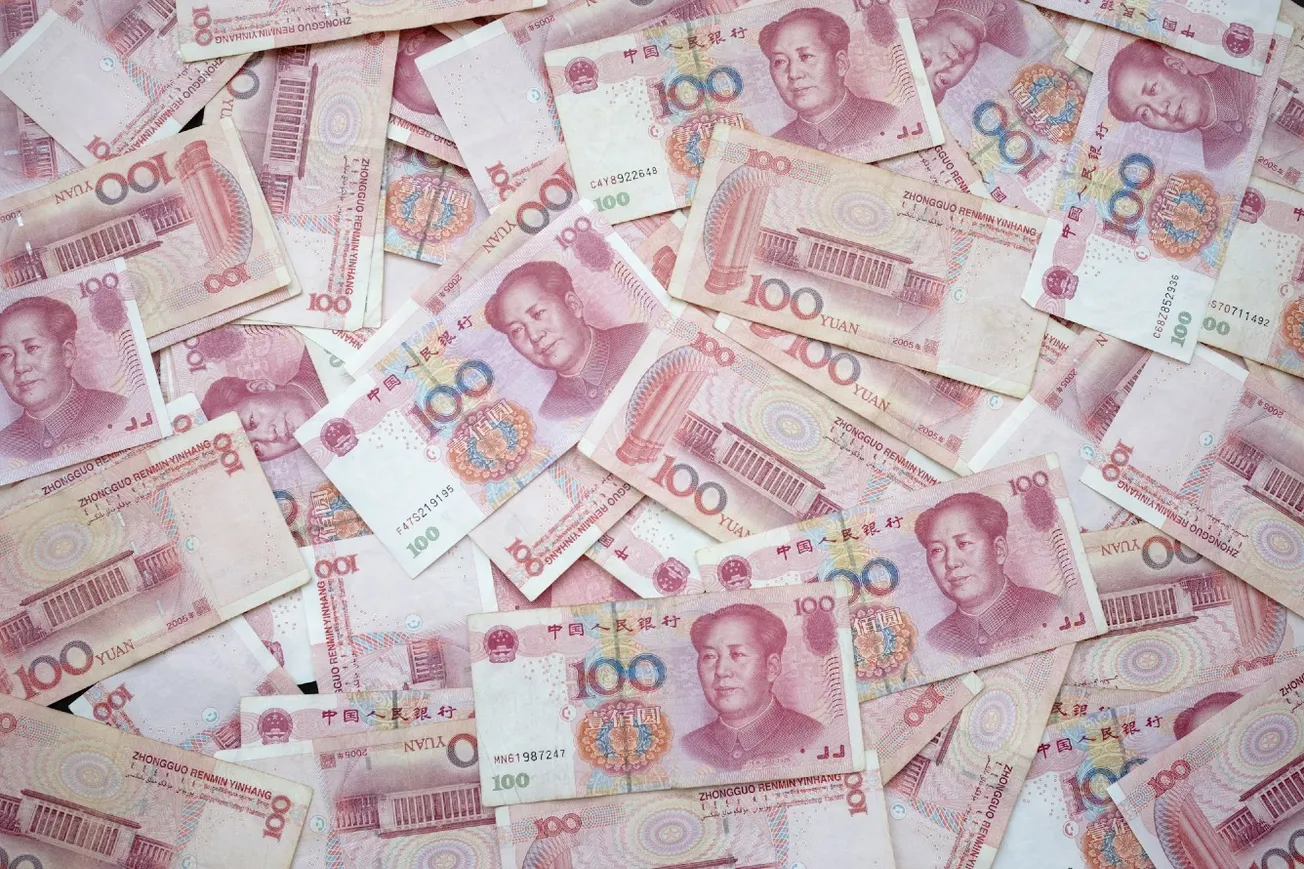On Wednesday, April 2, at 4 p.m., President Donald Trump will announce a series of tariffs on various nations to "liberate" America from decades-long trade practices that he contends have hurt Americans. When the tariffs kick in, they will likely change the way the world trades, not only with America but also with each other.
At the heart of Trump's frustrations, which he has consistently voiced for over 40 years, is a steadfast belief that every trading partner has taken advantage of America's relaxed policies and enforcement regime.
Though America emerged victorious following World War II, European countries and those in the Far East were left in ruins. The colonial powers were hastily withdrawing from their occupied colonies, leaving them in a shambles. A dozen new countries were formed in just the two years between 1947 and 1949: including India, Pakistan, Myanmar, Sri Lanka, Israel, North and South Korea, East and West Germany, the People's Republic of China, and Indonesia.
Standing tall, America indulged in a heavy dose of generosity, allowing the world to export to the United States duty-free, but ignored it when those countries set tariffs on American exports. The U.S. was so immensely wealthy compared to every other nation in the immediate decades after World War II that those tariffs did not bother Americans at all. Besides, America was the global leader in manufacturing back then. Everything an American household needed was made right here in the United States, using materials procured from within the country by American workers - the entire supply chain was American.
Buoyed by American largesse, other countries quickly began to develop their economies. Germany and Japan became industrial behemoths in just three short decades. In 1980, Japanese automakers held approximately 21% of the U.S. market, exporting nearly two million cars annually to the United States. Still, Washington shrugged the threat off, believing in Ronald Reagan's Miltonian economic mantra that for the world to prosper, free trade was the only route.
Reagan explained in an undated video the perils of protectionism that would result from imposing tariffs on foreign imports.
Sometimes, for a short while, it works, but only for a short time. What eventually occurs is that, first, homegrown industries start relying on government protection in the form of high tariffs. They stop competing and stop making the innovative management and technological changes they need to succeed in world markets."
"And then, while all this is going on, something even worse occurs. High tariffs inevitably lead to retaliation by foreign countries and the triggering of fierce trade wars. The result is more and more tariffs, higher and higher trade barriers, and less and less competition. So soon, because of the prices made artificially high by tariffs that subsidized inefficiency and poor management, people stop buying. Then the worst happens. Markets shrink and collapse, businesses and industries shut down, and millions of people lose their jobs.
It has been nearly 40 years since Reagan spoke, and the question now is whether Reagan was right or Trump is. Standing at a White House podium on March 3, Trump referenced Reagan, known within the GOP as the Godfather of free trade. "Look, I'm a huge fan of Ronald Reagan, but he was bad on trade, very bad on trade. He allowed a lot of people and a lot of business to be taken."
To prove his point, White House Press Secretary Karoline Leavitt provided examples on Monday of how America's "free trade" policies ended up becoming unfair trade for many Americans. The European Union imposes a 50% tariff on American dairy; Japan levies a 700% tariff on American rice; and India imposes a 100% tariff on American agricultural products. "This makes it virtually impossible for American products to be imported into these markets. It has put a lot of Americans out of business and out of work over the past several decades, so it's time for reciprocity."
By reciprocity, Leavitt means that America would tariff other countries the same way they tariff us. For example, America would impose a 50% tariff on EU dairy, a 700% tariff on Japanese rice, and a 100% tariff on Indian agricultural products. However, such a reciprocal tariff may not prompt other countries to act immediately. Consider Japanese rice. Specialty rice varieties such as Koshihikari and Akitakomachi are imported, primarily for Japanese restaurants and specialty markets. But, America produces its own rice, so imports from Japan are relatively low compared to imports from other countries like Thailand or India.
More importantly, Trump, the dealmaker extraordinaire, knows that tariffs can be a potent tool for bilateral trade negotiations. No country wants to be shut out of the wealthiest market in the world, so each country will scramble to make concessions rather than resist. If what Howard Lutnick, Trump's Commerce Secretary and the chair of the economic transition team, said during the campaign on CNBC is implemented — “As a general rule, we should put tariffs on stuff we make and not put tariffs on stuff we don't make” — even more countries will want to talk.
Trump's belief that the average American worker has become a victim of globalization and the so-called free trade regime is genuine, and he has never wavered from expressing it, dating back to his interviews with Oprah Winfrey and Phil Donahue in the 1980s. In the early 1980s, manufacturing in America was robust. The "Big Three" U.S. automakers—General Motors, Ford, and Chrysler—held a 77% share of the U.S. automobile market and a lead in the world market. Today, the "Big Three" U.S. automakers—General Motors, Ford, and Stellantis—hold only a 38% share. Even this number is misleading because Stellantis is no longer a thoroughbred American company; interests in France and Italy now own it. The top four brands in the world are not American—Toyota, Volkswagen, Hyundai, and Renault-Nissan-Mitsubishi. GM comes in at #5.
To be sure, the decline in American auto manufacturing is not solely due to other countries taking advantage of America. Intense competition (there are over 60 automobile manufacturers today), a change in consumer preferences (e.g., small cars, EVs), automation, and a move by companies to locate in countries with lower labor costs have all contributed. This trend is apparent in other industries as well. It is no surprise, then, that Americans working in the manufacturing sector have seen more than seven million jobs disappear over the last 40 years.
Trump intends to reverse this trend by imposing tariffs on foreign manufacturers, exempting them if they relocate to America and produce here. Trump's tariff ideas have never been tested on such a global scale since the 1930s.
The next few months are likely to be highly volatile, but Trump may yet eke out a win for America.
TIPP Picks
Selected articles from tippinsights.com and more
Trump 2.0
1. Jonathan Turley Says Even ‘Liberal Justices’ May Halt ‘Lilliputian Attack’ On Trump From District Judges—Harold Hutchison, DCNF
2. Trump’s America First Trade Revolution Is A Win For Working Families—Kevin Roberts, The Daily Signal
3. Pete Hegseth Announces He Is Ordering Equal Standards For Men and Women In Combat Roles—Wallace White, DCNF
4. As The Trump Administration Starts To Claw Back Waste, Fraud, And Abuse, Sanity Is Making A Comeback—Jeff Reynolds, CFACT
5. Kid Rock Confirms ‘Pleasant’ Trump-Maher Meeting—TIPP Staff, TIPP Insights
6. Liberation Day Is Coming. What's Ahead?—TIPP Staff, TIPP Insights
7. Trump Hints That Musk And DOGE May Be Ending Soon—TIPP Staff, TIPP Insights
8. Vance Defends The Decision To Send Man To Salvadoran Prison—TIPP Staff, TIPP Insights
9. Trump Inks Order Against Ticket Price Gouging—TIPP Staff, TIPP Insights
10. Federal Judge Delays Trump From Ending Immigration Protection For Venezuelans—TIPP Staff, TIPP Insights
11. White House Declares Signalgate Case Closed—TIPP Staff, TIPP Insights
World Affairs
12. Diplomacy Is The Newest Front In The Russia-Ukraine War—Richard Haass, Project Syndicate
13. Britain—Like France and Spain—Is Poorer than Mississippi—Ryan McMaken, Mises Wire
14. Biden Administration Was Secretly More Involved In Ukraine Than It Let On, Investigation Reveals—Wallace White, DCNF
15. Hamas Agrees To Deal That Includes Release Of American Hostage Edan Alexander—Virginia Allen, The Daily Signal
16. Euro-Lawfare? France Bans Nationalist Candidate From Running For Office—Fred Lucas, The Daily Signal
17. French Rhapsody — Le Pen Barred By Courts As Lawfare Goes Global—Editorial Board, TIPP Insights
18. Egypt's Sisi, Trump Discuss Gaza, Military Readiness—TIPP Staff, TIPP Insights
Economy
19. Do Inflationary Expectations Cause General Increases In Prices?—Frank Shostak, Mises Wire
20. Warren Buffett Gets It Wrong—Artis Shepherd, Mises Wire
21. Problems and Solutions: Illegal Immigration And The Construction Industry—Virginia Allen, The Daily Signal
Politics
22. Pfizer COVID-19 Bombshell Puts 2020 Election Into Context—Victor Davis Hanson, The Daily Signal
23. Biden Allies Reportedly Prepped For His Death As Early As 2023—Reagan Reese, DCNF
24. Zuckerberg’s Right-Wing Metamorphosis Appears To Be A Giant Facade—Robert McGreevy, DCNF
25. How Major American Law Firms Became A Tool Of The Left—Hans von Spakovsky, The Daily Signal
26. Kristen Clarke Met With The Southern Poverty Law Center—Tyler O'Neil, The Daily Signal
27. First They Came For The Op-Ed Writers—James Bovard, Mises Wire
28. Chuck Todd Issues ‘Warning’ To Kamala Harris About Political Future—Jason Cohen, DCNF
29. Poll Shows Residents In Maine Want Transgender Athletes Out Of Female Sports—Andrew Powell, DCNF
30. ‘Shame On You’: Karoline Leavitt Spars With Reporter Who She Accuses Of Covering For Criminal Illegal Immigrants—Nicole Silverio, DCNF
31. Democrat Senator Thinks ‘Average Middle American’ Is Too Dumb To Find Greenland On Map—Nicole Silverio, DCNF
32. FBI Whistleblower Pushed Out Under Biden Wins Battle To Publish Documents That Ended His Career—Eireann Van Natta, DCNF
33. MAHA: FDA Must Address Influx Of Dangerous Illicit Chinese Electronic Cigarettes—Joel Thayer, The Daily Signal
34. Georgia Democrat Senator Lives Rent-Free In $1M Home: Report—George Caldwell, The Daily Signal
35. Oversight Project Announces Independence From Heritage Foundation—Virginia Allen, The Daily Signal
36. House To Take Up Bill To Secure American Elections—Jacob Adams, The Daily Signal
37. Left-Wing Groups Call On Federal Election Agency To Defy Trump Executive Order—Fred Lucas, The Daily Signal
38. School Choice Soon Available To Half Of US Kids, But How It’s Designed Is Critical—Jason Bedrick, The Daily Signal
39. Nominally Nonpartisan, Wisconsin High Court Election Likely To Set Ideological Direction Of Bench—Jacob Adams, The Daily Signal
40. Congressional Republicans Seek to Slap Down Activist Judges, Curtail Universal Injunctions—Jarrett Stepman, The Daily Signal
41. Government Initiates Review Of Harvard Over Antisemitism Allegations—Moira Gleason, The Daily Signal
42. Screening Of Docuseries On Christian Dissidents In USSR To Feature Executive Branch Guest—Elizabeth Troutman Mitchell, The Daily Signal
43. ‘MAHA’?: New Jersey Democrat Introduces ‘Caffeine Safety’ Labeling Bill—George Caldwell, The Daily Signal
44. Tesla Owners Not Connected To DOGE Or Musk Are Acceptable Victims, According To 31% Of Democrats—Tyler O'Neil, The Daily Signal
45. What Is Sen. Cory Booker Protesting?—TIPP Staff, TIPP Insights
46. Jill Underly Faces Challenger in Wisconsin Education Race—TIPP Staff, TIPP Insights









